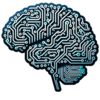
Back الذكاء الاصطناعي في المجال الصحي Arabic Intel·ligència artificial en el camp de la salut Catalan Künstliche Intelligenz in der Medizin German Inteligencia artificial en el campo de la salud Spanish Tehisintellekt tervishoius Estonian هوش مصنوعی در مراقبت پزشکی Persian Tekoäly terveydenhuollossa Finnish Intelligence artificielle dans la santé French स्वास्थ्य सेवा में कृत्रिम बुद्धिमत्ता Hindi Արհեստական բանականությունը առողջապահության ոլորտում Armenian

| Part of a series on |
| Artificial intelligence |
|---|
Artificial intelligence in healthcare is the application of artificial intelligence (AI) to copy human cognition in the analysis, presentation, and understanding of complex medical and health care data. It can also augment and exceed human capabilities by providing faster or new ways to diagnose, treat, or prevent disease.[1][2] Using AI in healthcare has the potential improve predicting, diagnosing and treating diseases.[3] Through machine learning algorithms and deep learning, AI can analyse large sets of clinical data and electronic health records and can help to diagnose the disease more quickly and precisely.[3]
AI programs are applied to practices such as diagnostics, treatment protocol development, drug development, personalized medicine, and patient monitoring and care.
Because radiographs are the most common imaging tests conducted in most radiology departments, the potential for AI to help with triage and interpretation of traditional radiographs (X-ray pictures) is particularly noteworthy.[4]
As widespread use of AI in healthcare is relatively new, research is ongoing into its application in various fields of medicine and related industries.
Using AI also presents unprecedented ethical concerns related to issues such as data privacy, automation of jobs, and amplifying already existing biases.[5] Furthermore, new technologies brought about by AI in healthcare are often resisted by healthcare leaders, leading to slow and erratic adoption.[6]
- ^ "Developing an aging clock using deep learning on retinal images". ai.googleblog.com. 2023-04-11. Retrieved 2023-06-01.
- ^ Mullainathan S, Obermeyer Z (May 2022). "Solving medicine's data bottleneck: Nightingale Open Science". Nature Medicine. 28 (5): 897–899. doi:10.1038/s41591-022-01804-4. PMID 35534570. S2CID 248668494.
- ^ a b Jimma BL (2023-01-16). "Artificial intelligence in healthcare: A bibliometric analysis". Telematics and Informatics Reports. 9: 100041. doi:10.1016/j.teler.2023.100041.
- ^ Adams SJ, Henderson RD, Yi X, Babyn P (February 2021). "Artificial Intelligence Solutions for Analysis of X-ray Images". Canadian Association of Radiologists Journal. 72 (1): 60–72. doi:10.1177/0846537120941671. PMID 32757950. S2CID 221036912.
- ^ Floridi L, Luetge C, Pagallo U, Schafer B, Valcke P, Vayena E, et al. (2019-09-01). "Key Ethical Challenges in the European Medical Information Framework". Minds and Machines. 29 (3): 355–371. doi:10.1007/s11023-018-9467-4. hdl:2318/1728336. ISSN 1572-8641. S2CID 49668711.
- ^ Petersson L, Larsson I, Nygren JM, Nilsen P, Neher M, Reed JE, et al. (July 2022). "Challenges to implementing artificial intelligence in healthcare: a qualitative interview study with healthcare leaders in Sweden". BMC Health Services Research. 22 (1): 850. doi:10.1186/s12913-022-08215-8. PMC 9250210. PMID 35778736.
© MMXXIII Rich X Search. We shall prevail. All rights reserved. Rich X Search
